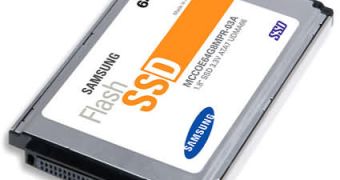Samsung Electronics made public the beginning of mass production for 1.8-inch SDDs (solid state drives) with a capacity of 64 gigabytes, being the highest density SDDs in today's mobile computing applications industry. The mass production of 64GB SSDs makes Samsung the world's largest producer of high-capacity SSDs.
SDDs are different than hard disk drives in a positive way, because they have superior reliability, faster application start-up times and faster boot times. Furthermore, an SDD can improve your notebook's battery life by 20 percent.
The new SDD has 64 eight Gigabit single-level cell flash memory chips and uses 51nm process technology, this permitting the fabrication of very small components: according to Samsung, each chip has circuitry 1/2500th the width of a human hair.
Jim Elliott, flash marketing director at Samsung Semiconductor Inc, declared: "We see sharply increasing interest in SSDs among OEMs worldwide amid a growing push to launch premium SSD-based notebooks, particularly in the ultra-mobile category."
Samsung wants to boost market development efforts for SDDs, relying on the fact that nowadays industry shows a continuous growing interest for ultra-slim notebook PCs that use flash memory based SSDs. It's already known the fact that Samsung introduced 32GB SSDs into UMPCs (ultra-mobile personal computers). SSDs can also be used for other digital consumer products like PDAs, printers or camcorders and it is thought they could be successfully implemented in server applications.
An accelerated growth of the 1.8-inch SSD market is anticipated, which will most probably lead to a need for smaller SDD formats and the development of new types of digital products. 2.5-inch and 3.5-inch SSDs will become popular in the next years and they will be commonly used in desktop PCs as well as in notebooks.
Samsung believes that until 2010 the sales of SDDs will increase with about 270 percent, becoming the largest growth sector in the NAND flash industry.

 14 DAY TRIAL //
14 DAY TRIAL //